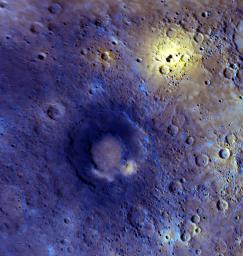Evidence of Volcanic Activity on Mercury
Caption:
This enhanced-color view was created with a
statistical technique that highlights subtle color variations seen in the 11 WAC filters
. These variations are often related to composition. Merged with images from the
higher-resolution NAC
, the two sets of observations tell the story of the geology of the area and the compositional differences of the features observed. This region, viewed in detail for the first time during the third flyby, appears to have experienced a high level of volcanic activity. The bright yellow area near the top right is centered on a rimless depression that is a candidate site for an explosive volcanic vent. The double-ring basin in the center of the image has a smooth interior that may be the result of effusive volcanism. Smooth plains, thought to be a result of earlier episodes of volcanic activity, cover much of the surrounding area.
Date Acquired:
September 29, 2009
Instrument:
Wide Angle Camera (WAC) and Narrow Angle Camera (NAC) of the Mercury Dual Imaging System (MDIS)
Resolution:
1.0 kilometers/pixel (0.6 miles/pixel)
Scale:
The double-ring basin in the middle of the image is 290 kilometers (180 miles) in diameter
Background Info:
These images are from MESSENGER, a NASA Discovery mission to conduct the first orbital study of the innermost planet, Mercury. For information regarding the use of images, see the MESSENGER
image use policy
.
Cataloging Keywords:
| Name |
Value |
Additional Values |
| Target |
Mercury |
|
| System |
|
|
| Target Type |
Planet |
|
| Mission |
MESSENGER |
|
| Instrument Host |
MESSENGER |
|
| Host Type |
Orbiter |
|
| Instrument |
Mercury Dual Imaging System (MDIS) |
|
| Detector |
|
Narrow Angle Camera (NAC), Wide Angle Camera (WAC) |
| Extra Keywords |
Color, Volcano |
| Acquisition Date |
|
| Release Date |
2009-11-03 |
| Date in Caption |
2009-09-29 |
|
| Image Credit |
NASA/Johns Hopkins University Applied Physics Laboratory/Carnegie Institution of Washington |
| Source |
photojournal.jpl.nasa.gov/catalog/PIA12363 |
| Identifier |
PIA12363 |

 Planetary Data System
Planetary Data System
